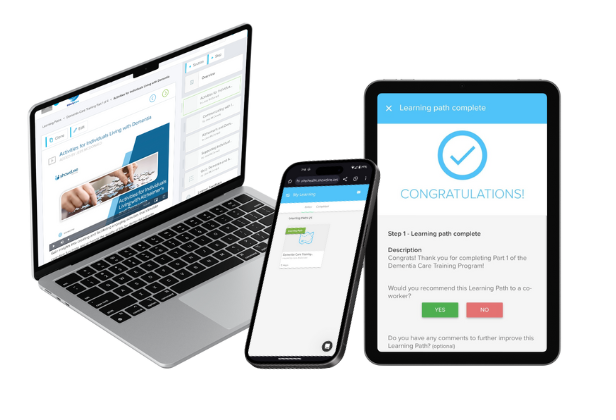Building A Customer-Centric Culture In Post-Acute Care
Post - Building A Customer-Centric Culture In Post-Acute Care
Customer service in post-acute care is a fundamental aspect that can truly make a difference in the patient and resident experience, directly impacting their overall well-being and recovery journey. That’s because the care provided in a post-acute care setting is not just physical—it’s emotional and psychological as well.
From direct care staff to non-direct personnel, every team member plays a vital role in ensuring that patients and residents feel heard, supported, and respected throughout their journey. And by prioritizing the need for personalized support, clear communication, and emotional care, healthcare providers can create a nurturing environment that fosters healing and higher satisfaction among those receiving care and their families.
The Benefits Of A Customer Service Mindset In Post-Acute Care
Providing quality care is the first priority of any post-acute care provider. But as you know, the manner in which that care is delivered (empathic vs. indifferent) can have a major impact on overall outcomes, including:
- Improved Patient Experience: When staff are trained to be attentive, empathetic, and responsive, patients and residents feel valued and respected. This fosters a sense of trust and well-being, which can positively impact their healing process.
- Greater Trust & Reduced Anxiety: Effective communication builds trust and reduces anxieties. A customer-service focus ensures clear communication with patients, residents, and families about care plans, goals, and any concerns.
- Increased Satisfaction: Satisfied patients and residents are more likely to follow through with therapy plans and discharge instructions, leading to better long-term outcomes.
Building a Customer-Service Culture
Providing a stellar patient experience goes beyond providing great care–it’s a dedication to understanding the needs and concerns of those you service, not just their medical conditions. But to achieving this level of service can only be achieved when it is truly ingrained in your culture.
Leadership Sets The Pace
Creating a customer-centric organization starts from the top and sets the tone for the entire organization. Invest in training for leadership to develop stronger communication and interpersonal skills that allow them to more effectively communicate with staff, patients, and families.
Feedback Paves New Avenues
Evaluating care outcomes should go beyond clinical skills. Ongoing patient and family surveys are a simple way to gain valuable feedback not only on physical outcomes but emotional ones as well. Do patients and residents feel supported and heard? Would they recommend your organization to a friend or relative? Questions like these allow your organization to identify actionable insights for improvement.
Empowered Employees Go The Extra Mile
Empower your staff at all levels to directly address patient concerns. This doesn’t mean every staff member can resolve every issue, but it does mean creating a culture where staff feel comfortable approaching patients and families and have the authority to take some initial steps to address their concerns.
Soft Skill Development In Healthcare
Empathy, communication, conflict resolution—these so-called “soft skills” don’t necessarily come naturally to everyone. That’s why it’s important to invest in training programs that work to develop these skills at the foundation of a positive patient interaction.
- Empathy training helps staff see things from the patient’s perspective and understand their emotional needs.
- Active listening skills ensure staff are fully present and engaged in conversations with patients, picking up on both verbal and nonverbal cues.
- Clear communication means information is delivered in a way that is easy to understand, avoiding medical jargon and ensuring clarity on expectations and next steps.
- Conflict resolution training equips staff with de-escalation techniques and strategies for addressing difficult conversations in a respectful and productive manner.
CUSTOMER SERVICE IN HEALTHCARE
Get a preview of how we’re helping employees develop the essential skills and strategies needed to enhance patient and resident interactions to ensure exceptional customer service in post-acute care.
Recognize Exceptional Service
What gets recognized gets repeated. Publicly recognize and reward staff who consistently demonstrate exceptional customer service. This could take the form of employee of the month awards, spot bonuses, or simply a handwritten thank-you note from a supervisor or even a patient, resident, or their family member.
Highlight specific examples of how the staff member went above and beyond to create a positive experience. When recognition is specific and timely, it reinforces the desired behaviors and motivates staff to continue providing excellent service.
Remember: Customer service isn’t just about politeness. It’s about fostering a genuine sense of care and compassion. By prioritizing customer service and equipping your staff with the right tools, you can create a caring environment that promotes healing, strengthens relationships, and empowers both patients and staff to thrive.
Showdme is dedicated to supporting your organization and your mission to provide exceptional care. Our unique, white-glove-style approach to training ensures a hassle-free experience for you and your employees. Acting as an extension of your team, we manage your entire training process including program development, employee enrollment, completion reminders, multilingual end-user support, plus certificate delivery, management & storage.
See why showdme has the highest completion rates of any other LMS or e-learning platform on the market today. Click here to learn more.

Let Us Show You More
See how showdme's unique service-first approach to training helps hundreds of healthcare organizations ensure compliance. Request a demo today!

